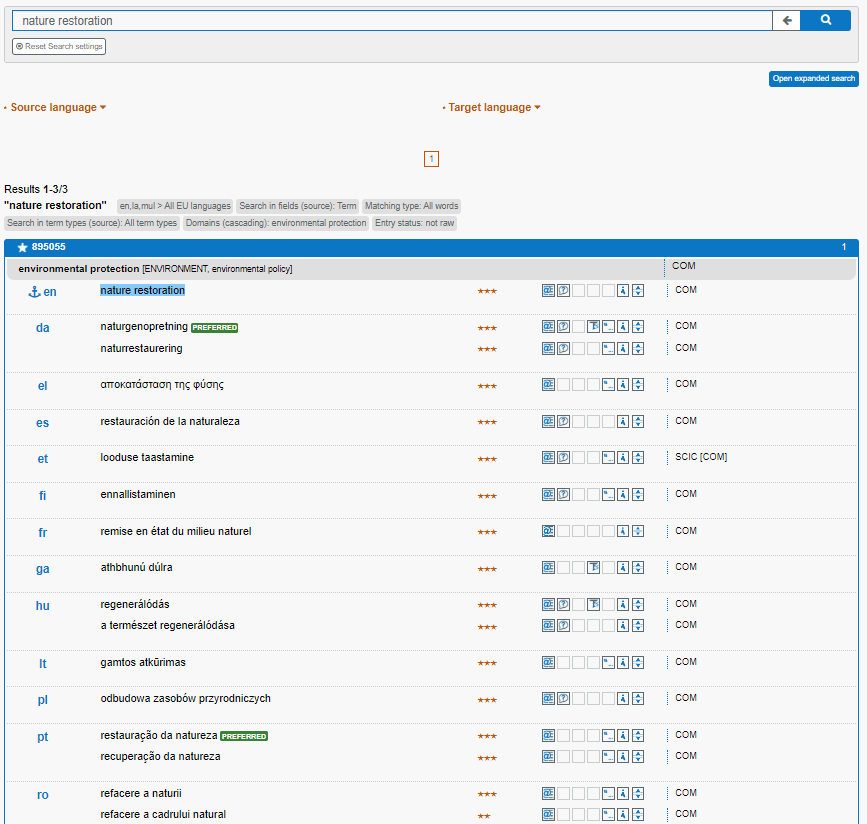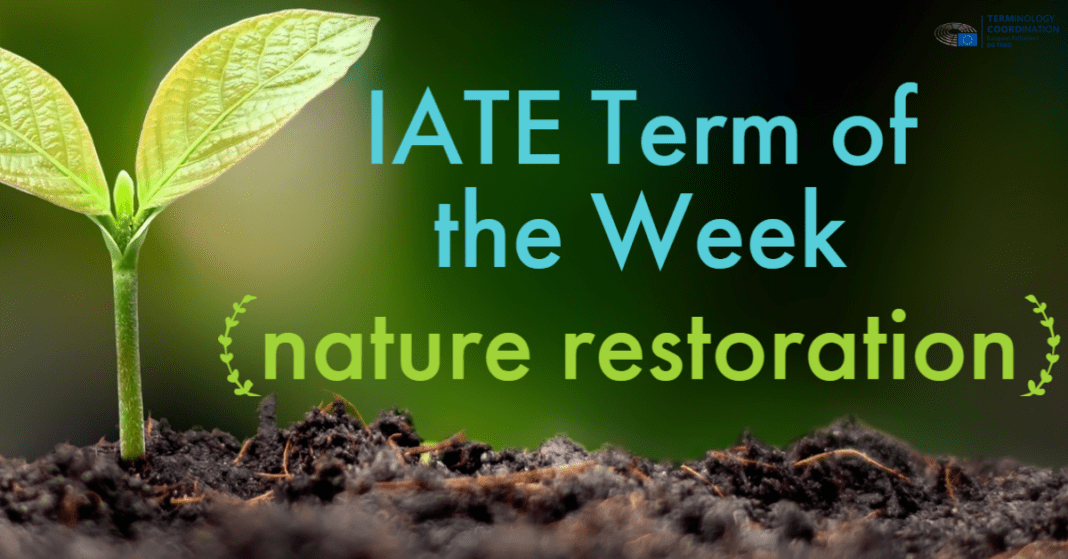Nature restoration is a concept that encompasses the efforts to repair and revive ecosystems that have been degraded or damaged by human activities. It involves the rehabilitation of habitats, reintroduction of native species, and the promotion of sustainable land and water management practices. In IATE, the definition of this term is “recovery of the natural environment of areas where the natural environment has been damaged or destroyed”.

The European Union (EU) has recognized the importance of nature restoration as a crucial component of environmental conservation and has been actively engaged in promoting and supporting these initiatives. The EU institutions, particularly the European Commission, have taken significant steps to prioritize and integrate nature restoration into their policies and programs. The EU Biodiversity Strategy for 2030, announced in May 2020, outlines a comprehensive framework for restoring and protecting nature across the EU. The strategy sets ambitious targets, including the restoration of degraded ecosystems, the establishment of protected areas, and the integration of biodiversity objectives into various sectors, such as agriculture, forestry, and fisheries.
The EU institutions have also played a significant role in the development and implementation of legislation aimed at safeguarding and restoring natural habitats and species. Some of the directives that have been adopted in order to achieve this goal establish a network of protected areas known as Natura 2000, covering over 18% of the EU’s land area and around 6% of its marine area. Natura 2000 sites are crucial for the conservation and restoration of Europe’s most valuable and threatened habitats and species.
Furthermore, the EU institutions have allocated significant funding for nature restoration projects through various financial mechanisms. For instance, the LIFE program, the EU’s funding instrument for the environment and climate action, supports nature restoration initiatives, including habitat restoration, reforestation, and reintroduction programs. The EU’s Common Agricultural Policy (CAP) also incorporates measures that incentivize farmers to adopt environmentally friendly practices, contributing to the restoration of agricultural landscapes and the preservation of biodiversity.
In addition to these legislative and financial efforts, the EU institutions actively collaborate with Member States and NGOs to promote knowledge exchange, research, and best practices in nature restoration. They provide guidance and support to member states in developing and implementing national restoration strategies and encourage cross-border cooperation to address transboundary conservation challenges.
By embracing nature restoration as a fundamental pillar of its environmental agenda, the EU demonstrates its commitment to halting biodiversity loss, combating climate change, ensuring a sustainable future for its citizens, preserving Europe’s natural heritage, promoting a healthier environment and fostering the well-being of both people and ecosystems.
Related terms: Nature Restoration Law, EU Nature Restoration targets
References
European Comission. (2020, May). Environment. Retrieved from Energy, Climate change, Environment: https://environment.ec.europa.eu/strategy/biodiversity-strategy-2030_en#:~:text=The%20EU%27s%20biodiversity%20strategy%20for,contains%20specific%20actions%20and%20commitments.
European Comission. (2021, November). LIFE Programme: More than €290 million in EU funding for nature, environment and climate action projects. Retrieved from Press corner: https://ec.europa.eu/commission/presscorner/detail/en/ip_21_6178
European Comission. (2023, July ). Nature and biodiversity. Retrieved from Environment: https://ec.europa.eu/environment/nature/natura2000/index_en.htm
European Comission. (2023). The common agricultural policy at a glance. Retrieved from Agriculture and rural development: https://agriculture.ec.europa.eu/common-agricultural-policy/cap-overview/cap-glance_en
European Council. (2023, June). Council reaches agreement on the nature restoration law. Retrieved from Council of the EU – Press release: https://www.consilium.europa.eu/en/press/press-releases/2023/06/20/council-reaches-agreement-on-the-nature-restoration-law/
WWF. (2023). Towards an EU law to restore nature. Retrieved from Nature restoration: https://www.wwf.eu/what_we_do/biodiversity/nature_restoration/
Written by Carmen del Campo Hermida

Born in Madrid, Spain, Carmen holds a Double Degree in Translation and Interpreting and Bachelor in Global Communication. She has also studied a Degree on Content Marketing and Social Media. She has been combining her studies with some part-time jobs, which has allowed her to appreciate little things in life, such as spending time with her family and friends and enjoying her hobbies. She is keen on learning from other people and cultures and wishes to travel around the world someday.

